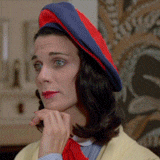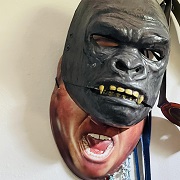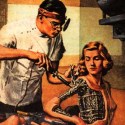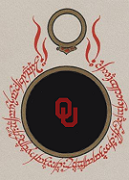|
Kchama posted:Is Planet Called Treason the one where the villain is evil because the protag's dad raped her a lot? https://en.wikipedia.org/wiki/A_Planet_Called_Treason er, i definitely don't remember that. its essentially a critique against the idea of a ruling intelligentsia. quote:The premise of this novel is the banishment to the seemingly metal-poor planet Treason of a group of people who attempted to create rule by an intellectual elite. The novel centers on the descendants of these anti-democratic thinkers who remain imprisoned on the planet. Through the ages, these descendants have formed nations which warred and allied with one another to gain advantages over their rivals in the race to build a starship. Due to the metal-deficiency on Treason, nations are forced to obtain it through a system of barter using teleportation devices known as Ambassadors.
|
|
|
|

|
| # ? Apr 25, 2024 02:32 |
|
Aruan posted:https://en.wikipedia.org/wiki/A_Planet_Called_Treason You didn't because it's the wrong book. The one I was thinking of was https://en.wikipedia.org/wiki/Hart%27s_Hope I only remembered it after you said it wasn't it. Kchama fucked around with this message at 20:55 on Feb 11, 2021 |
|
|
|
The Oldest Man posted:I have mentally edited out so many weird sex scenes from sci fi novels that I actually don't trust myself to make recommendations to normies anymore which is partially why I asked this question in the first place. The other reason is that I think a major component of many science fiction writers' engagement with politics is envisioning a political order that makes the world a safe and/or mandatory place for their sexual fetishes. Heinlein for sure falls into this category.  " "
VitalSigns fucked around with this message at 21:30 on Feb 11, 2021 |
|
|
|
Aramis posted:This somehow put back the memory of reading Dan Simmon's Olympos in my mind. I read Ilium, then I read Olympos, then I bought Ilium and decided to pretend that Olympos didn't exist. There's a reason for that. Recently I've been reading The Power by Naomi Alterman. It posits a world where women grow an organ that allows them to release electric pulses like electric eels, effectively reversing the gender power balance. Fantastic book, but very intense--it definitely doesn't go for the "women are inherently wiser and gentler and superior etc etc etc" utopia that you can get occasionally in sci-fi books about gender politics. I'd definitely recommend it for political sci-fi readers. I'm outing myself as a weeb, but I have to bring up Legend of the Galactic Heroes, by Yoshiki Tanaka. Set in the far future after humanity has colonized the galaxy, LOGH is a vast, intricate saga about a war between a crumbling autocracy and a crumbling democracy. There's a lot to love about this series--the fantastic world-building, the vibrant characters, the complexity of the war itself--but one of its greatest appeals is its exploration of the flaws and strengths of politics systems, in my opinion. The novels have all been legally released in English, too, so the series is far more accessible than it was in the past. Can we recommend fantasy books as well? Or graphic novels? There's a couple of books/series that I think deserve attention. Viola the Mad fucked around with this message at 21:23 on Feb 11, 2021 |
|
|
|
The Oldest Man posted:At least this guy's bizarre sex content was all between consenting adults as far as I can remember. Most of KSR's weird sex stuff (and there's not that much) is in service of exploring how relationships might change as we move away from a family consisting of a man, a woman and 2.5 kids, which is something I wish SF/F would explore more. It's always dispiriting when you're reading a story set a thousand years in the future and every family has a mom and a dad, or two dads or a polycule or something (i.e., stuff we have now). Although people in his stories do end up having group sex in swimming pools a lot more than you'd expect. Aramis posted:If you haven't, you might want to check out Alastair Reynolds, particularly his post-Revelation Space stuff. Some people feel like he pushes a bit into performative wokeness, but I personally find it absolutely fine. I'll add him to the list. I don't have a problem with wokeness, but there's a very fine line where I lose all interest if I feel like I'm being preached at, even if I agree with the author.
|
|
|
|
Lester Shy posted:I'll add him to the list. I don't have a problem with wokeness, but there's a very fine line where I lose all interest if I feel like I'm being preached at, even if I agree with the author. It's more that he randomly makes characters Queer, Trans or have every character in a novel be African for no narrative reason whatsoever. The unremarkability of it is the point. Aramis fucked around with this message at 21:09 on Feb 11, 2021 |
|
|
|
how can we be talking about Weird Sex Stuff and nobody has brought up later Dune although credit where credit is due, I think the political setup in Dune is one of the most novel (get it!), especially for 60's/70's scifi where everything else is 'what if Cold War but in SPACE'
|
|
|
|
Aruan posted:for acclaimed, maybe william gibson? as far as i know there are no weird sex things in any of his work. there's also dan simmons, but, uh, don't read anything after 9/11 because 9/11 broke his brain. but hyperion is still one of the best scifi books ever written, and i like the sequels. In Neuromancer, Molly explains that she sold the use of her body as a sex doll to afford her implants, and one time she woke up while she was being raped. I think Riviera uses his hologram implants to make her re-experience that during the Straylight Run.
|
|
|
|
PeterWeller posted:In Neuromancer, Molly explains that she sold the use of her body as a sex doll to afford her implants, and one time she woke up while she was being raped. I think Riviera uses his hologram implants to make her re-experience that during the Straylight Run. i think the distinction is that's presented as a bad thing and a symptom of the exploitation and brutally of their corporate controlled dystopia, which is a pretty stark difference from so many other scifi authors who bend over backwards with "rape is good because..." (see dan simmons). the specific context is that as a sex doll part of the arrangement was that she wouldn't have memory of anything that happened (they install a neural cutout), but her corrupt boss found out she was getting implants and exploited her - and the cutout failed - and she got revenge. riviera references it during his performance at the restaurant before they start the run because that type of visceral horror was appealing to the living tessier-ashpool as part of a commentary on how rich people are bad. Owlspiracy fucked around with this message at 21:30 on Feb 11, 2021 |
|
|
|
Here’s the thing about William Gibson: He was a draft dodger who did a lot of acid and speed and wrote the kind of novels you would expect someone with that sketchbook bio to write. Then he got famous and many of his fans ended up being the people building the megacorps he dreaded, he hung out with Bono, and now his books are him seeing the megacorps he used to dread coming into themselves, and he just said “Cool!” and releases books about weird apps and gadgets that he wishes would fix his inability to feel like he used to, because his dread has become anchored to the idea of the kind of life the megacorps provide him and other first-worlders being disrupted by the sort of people he used to cast as protagonists. He is Still With Her, too.
|
|
|
|
Aruan posted:how can we be talking about Weird Sex Stuff and nobody has brought up later Dune Got way too bored by the first couple sequels to get to the later stuff I want to read about Paul's grandson becoming a giant immortal space worm but ahhh so much bullshit I don't care about....
|
|
|
|
Darkrenown posted:There's some weird scifi takes going on in here! The problem is that this is literally an anti-socialist screed. He takes pains to justify it 'with reality' but every anti-whatever screed does that. Justifying why something sucks and is awful by making in-universe decisions deliberately to make them look bad is pretty much how these things work. Because the core conceit is that a UBI is inherently unsustainable, and thus you HAVE to go loot other planets to ever keep it going. I have no idea what you mean about "the protagonist is exploiting her own government to get rich at their expense", you might be thinking of another series entirely. [/quote] I wasn't the one who said that. quote:The thing about the Solarian league is that most of the members are just chill/lazy, 95% of what we see of them is basically if ICE took over the US coast guard and started annexing south America (and the USA was 1000 times richer but the federal government had 1/10th the power over states and taxation) and none of the US media reported on it. Dude, at the start of the books they were said to basically have not only the best fleet in the universe, but also the BIGGEST fleet in the universe to the point that if everyone else got together and fought them, they'd still win easily. At the end of the books we find out that the vast majority of their fleet that they can't actually reactivate because they can't afford it and is suppose to be that massive hyper death fleet everyone was literally making GBS threads themselves over in the first few books turn out to be 200 years out of date and that even their currently active fleet hasn't had any serious upgrades (and not the 'Fleet 2000' thing mentioned that turned out to making the consoles look cooler so they'd be more impressive in 'newsie reels'.) in a hundred years. quote:It's not even that SL tech is much worse towards the end, it's just that they are so used to being the top dog no one wants to pay to upgrade their massive fleet with the new goodies because they "know" they are the best already. They have various factions, including some who are desperately trying to tell the others that they are now about to confidently march at the machineguns for a Somme-type massacre, but due to a mixture of arrogance, bureaucracy, and the fact that the Mesans have infiltrated their government and are constantly pushing for war and dismissing the tech reports, the "everything is fine" faction are in control. The Mesans were setting the SL up for a defeat so that their various control state governors can secede over the disaster. Yeah this is all just stupid bullshit that's "The bad guys were insanely stupid and blind and every bad thing I can thing of and that''s why they lost so easily". Look, just because there's an in-universe explanation of something doesn't mean it's a good explanation. Authors manipulate things to go how they want. This is pretty clearly that. quote:In the final battles the SL still vastly outnumbers the alliance, but the tech difference sees them defeated fairly handily in that series of battles. However, they are still so large the alliance is desperate for peace because they know a) the SL isn't the real enemy, the Mesans are, and b) if the SL member planets actually wanted to they could build a zillion ships faster then the alliance could occupy their shipyards. The peace deal was basically "seriously, fire the leader of ICE and maybe make a law saying they can't invade other nations". The Grand Alliance literally lost zero ships and suffered zero casualties while the SL fleet was completely wiped out to a man. It was literally effortless. It takes years to put out ships, and the idea that they can't just defeat easily beat them all if they wanted pretty much stretches it since even the Solarian League's literal best stuff was easily annihilated. quote:Not sure what you mean about the cover art, writers famously have little control over that and she doesn't look how she is described in the books (she's darker skinned with Asian features). That cover is basically Villain.jpg and uses all sorts of coding that you'd normally see for a villain on the cover. quote:The spy drones can't go into or even near the church capital, so they don't know everything and get blindsided on several occasions. Weird how when they find another android copy of herself there's no problem letting her stay female. Like, the good society was the one where it literally doesn't matter. quote:She never once pretends to be a space angel either You should have read the rest of the thread. Someone already pointed out my mix-up and I admitted it.
|
|
|
|
I liked David Brin a lot back in the day. His primary political message was pushing Tikkun Olam, a sort of obligation to better the world that exist for societies, governments and individuals. I'm sure a lot of folks would say he flirts with eugenics though, considering his being a major proponent of uplift I dont think he did any sex pest stuff or has any particularly noxious takes on modern politics, even though he has written on politics outside his sci fi quite a bit
|
|
|
|
GlyphGryph posted:I liked David Brin a lot back in the day. His primary political message was pushing Tikkun Olam, a sort of obligation to better the world that exist for societies, governments and individuals. I have bad news for you. (David Brin is a real rear end in a top hat)
|
|
|
|
Oh he is absolutely an rear end in a top hat on a personal level from what I hear. He's just not a sex pest or inclined towards fascism, unless I missed something? Which is possible, it's been years.
|
|
|
|
I really liked the Postman when I was younger, and the central plot of that book was right-wing survivalists collapsing civilization by being abhorrent shits in an otherwise survivable crisis. Sucks that Brin is a bit of an rear end, but the protagonist in that book is a sanctimonious prick at times so I guess it makes sense in retrospect.
|
|
|
|
Gosh, Ilium/Olympos. My first exposure to 9/11 Induced Brain Disease in an artist. If I remember correctly, the sequel reveals that Those Nefarious Muslims, having failed to conquer the world conventionally in their "Global Caliphate" (?): -- Created a bunch of black hole bombs that would blow up the entire planet, -- Engineered a plague to wipe out all the Jews, but on account of being dumb savages accidentally made a plague that wiped out all the non-Jews. -- Created a race of seemingly-innocuous robots, programmed them with a secret "kill-all-Jews" activation trigger, and sent the robots into the future as a failsafe in case their other evil plans failed! And the first book was a silly excuse to have The Iliad and The Tempest in Space!
|
|
|
|
Aramis posted:It's more that he randomly makes characters Queer, Trans or have every character in a novel be African for no narrative reason whatsoever. The unremarkability of it is the point. Blue Remembered Earth had African characters but as the first two things I never picked up on an abundance there? Like one character in Chasm City/Redemption Ark? If there's anything more notable it's that he'll have a gross biological thing in most books and his voice changes when talking about astronomy. One of my favorite authors though. Lol though that the language in House of Suns is Trans
|
|
|
|
The Oldest Man posted:I've read a bunch of his work but I wouldn't call him acclaimed; the closest he came was when those right wing reactionaries nominated one of his books for a Hugo to try to get back at Ann Leckie and he withdrew from consideration. That reminds me, how did that whole Hugo drama thing go down? Chud authors supposedly thought they were being snubbed for writing chud books, when they just weren’t writing anything worthy of an award? Are there still factions and fighting over this?
|
|
|
|
Anticheese posted:Blue Remembered Earth had African characters but as the first two things I never picked up on an abundance there? Like one character in Chasm City/Redemption Ark? Hmmm, maybe it's more constrained to the Blue Remembered Earth Trilogy, and it's the recency bias kicking in. And even then, considering the whole trilogy is just a very elaborate excuse to put elephants in spacesuits, the entire cast being African is not that arbitrary in retrospect. For the other stuff, I was thing specifically of Travertine, which you only know are trans because everyone respects ver preferred pronouns. Aramis fucked around with this message at 23:09 on Feb 11, 2021 |
|
|
|
I'll bite. Here's an effortpost / Eden is the earliest of these, and the gist of the story is that a rocket with 7 spacemen (yes, all men, this is a bit of a theme with Lem) accidentally land on a planet that's gone absolutely bonkers with a weird cryptology-obsessed fascist regime. The cosmonauts see things that are somewhat incomprehensible, like an alien graveyard slash museum, where different variations of the alien species' physiology are stored sort of on display. Oh, and then actual mass murder, of course. The theme of the book is that the cosmonauts slowly try to puzzle out what kind of mess they're in, and debate things like trying to liberate the oppressed aliens from the ruling aliens, and what the hell the alien civilization is actually doing, and is it humanity's right to interfere, and all that good stuff. Ultimately the cosmonauts meet an educated, older alien who tries to explain to them how their society works, and how awful and unfixable it is. The men opt to just leave, and the educated alien expresses a wish to be euthanized. It's an interesting take on exploring a horrifying dystopia by literally dropping clueless protagonists in the middle of it to try and figure out what is happening. His Master's Voice is the most terrestrial-politics-related of these, at least explicitly. The idea is that humanity, in the book the United States in the middle of the cold war, finds an alien signal being broadcast from a faraway star system, and attempt to decipher it. An important plot point, being that it's the freaking cold war, is the logic behind the US "getting there first", how politicians (who are expressly the Bad Guys of the novel) view scientific research, and scientists as petulant children to be herded into making bigger bombs no matter how nonsensical it may be to the research topic, an alien broadcast, and scientists / author self-inserts debating MAD in general. The book also contains some interludes about the actual Nazis, so for a rather interesting criticism / observations about how fascists operate, here's a good recommendation! The Invincible is the least overtly political of these. The book is about a routine space exploration trip by all-male cosmonauts visiting a previously unexplored planet. This novel's a sort of exploration of the classic burly men in space doing space things, except things go rather wrong because the planet is "populated" by a species of robots who have been evolving by themselves for thousands of years, and the central question for the cosmonauts becomes, what is mankind's role here? How much should we interfere with this completely alien phenomenon? In that way it's definitely also a criticism of the stereotypical hero-worshipping space-farer conquers evil aliens - type of sci-fi. Fiasco is an extension of these themes. Humanity sends out a star ship after SETI finds a nascent civilization in a relatively (hah!) close-by star system. Once the cosmonauts arrive, it turns out the alien civilization is embroiled in a massive, incomprehensible cold war of their own. The conflict for the cosmonauts becomes, how do they attempt to force contact, and should they attempt contact, with a civilization that is actively rejecting communications due to their own issues? Things keep escalating in a definite MAD-style chain of logic, which the novel explores and criticizes, and well the title is a bit of a spoiler  Lem is very pessimistic about humanity meeting an alien civilization, and he's also very pessimistic about how humanity itself functions, with itself. Lem is very pessimistic about humanity meeting an alien civilization, and he's also very pessimistic about how humanity itself functions, with itself.A couple of honourable mentions: Memoirs Found In a Bathtub is a brief, satirical exploration of how alphabet soup agencies work, or actually don't work at all. Return From the Stars, about a cosmonaut returning to Earth after a relativistically-long space journey, has a lot of exploration of human society, and a very good interlude about humanity's relationship to robots and wantonly destroying seemingly sentient creatures, a disturbing allegory for sure, but it also has a very problematic "romantic" plot line, which the novel does sort of recognize as such though, but still, caveat emptor on this one.
|
|
|
|
Aruan posted:i think the distinction is that's presented as a bad thing and a symptom of the exploitation and brutally of their corporate controlled dystopia, which is a pretty stark difference from so many other scifi authors who bend over backwards with "rape is good because..." (see dan simmons). the specific context is that as a sex doll part of the arrangement was that she wouldn't have memory of anything that happened (they install a neural cutout), but her corrupt boss found out she was getting implants and exploited her - and the cutout failed - and she got revenge. riviera references it during his performance at the restaurant before they start the run because that type of visceral horror was appealing to the living tessier-ashpool as part of a commentary on how rich people are bad. That's a fair distinction. selec posted:Here’s the thing about William Gibson: I see two flaws in this characterization. First, I don't think he ever actually dreaded megacorps all that much. I think he takes late capitalist dystopia as a given and is more interested in writing stories about computer programs coming to life. Second, I think you're right to say that he's concerned about his first-world life being disrupted, but you're wrong to imply that the people he used to cast as protagonists were not themselves also first-worlders. But it is disappointing that the follow up to his novel about the first world turning around and exploiting itself after destroying the rest of the world is a novel about how an app comes to life and Hillary saves the world.
|
|
|
|
Ethics_Gradient posted:Definitely fascist, but what part is libertarian? It's been half a lifetime since I last read Troopers, which was one of my favourite books growing up (not because of the politics - liked the narration style and way you could see Rico mature over the course of the novel), but I don't remember hearing much if anything about the economic system in the book. If anything it came off as "government controls everything". Now that I think about it, is fascism even compatible with libertarianism? I'm not saying either is good, mind you. Heinlein's writing is all political. Either he's writing about political systems explicitly or he's writing apologia for why a political system shouldn't exist that infringes the things he wants to be able to do. The short answer about Starship Troopers is that he's writing a world in which a libertarian-magnates-of-industry economy (ie the non-service-non-voting-citizen world) is explictly compatible with a fascist government. Rico comes from a rich merchant/business family, and they don't want him to enlist (and try to bribe him out of it) by telling him he can be a ~master of his destiny!~ if he'll just take over the family business. Rico chooses to join the military but it was clear that this is only a prerequisite for getting into the government, not for being John Galt, and that he was kind of a dipshit as a rich kid for choosing what he did - but that it was correct that it was his choice. Heinlein is imagineering a world in which we can have our individualist libertopian paradise and our war economy fascist oorah nuke the reds militarized society at the same time. Note that his fascist full military society actually lacks universal male conscription which is one of the most common features of militarized societies in real life because to include it would cut against his libertarian dream world ideal. The rest of the non-military society is all off-screen in favor of more sick democracy nukes turning Asiatic commie bugs into chunky salsa, but you get the gist. The reason why it appears to be a thought experiment is because you're probably like "what the gently caress, no way could anyone seriously want that" but at the time those were two things he wanted that he was trying to reconcile with each other. Later on he focused more on the stuff that was truly important to him: imagining a future society in which he would be free to gently caress his kids without judgment. VitalSigns posted:Definitely don't read late Niven then because you will have to mentally edit out at least half of Ringworld etc. My mental record of Ringworld is "We found a mysterious artifact and want you, world's most boringest man, to help us explore it" SCENE MISSING "Turns out it was metal eating bacteria" GlyphGryph posted:Oh he is absolutely an rear end in a top hat on a personal level from what I hear. He's just not a sex pest or inclined towards fascism, unless I missed something? Which is possible, it's been years. He's 1000% in love with eugenics though. VitalSigns posted:I want to read about Paul's grandson becoming a giant immortal space worm but ahhh so much bullshit I don't care about.... God Emperor of Dune is the best book in the series and it's not even close in my opinion. The first book is just a play on the monomyth and frankly not all that interesting except as a prelude to what follows, the second and third books are an interesting sci fi political drama (better written but not substantially better or of a different literary character than like ASofIaF), but it's only in the fourth book where Herbert really gets to go full throttle on his ideas about predestination and the hero myth and it is hog loving wild. After that you start getting dumb poo poo like the Honored Matres that is Niven-grade slut mind control and the corpse puppetry of the later sequels is just gross, but God Emperor is really an amazing and singularly unique book.
|
|
|
|
The Oldest Man posted:He's 1000% in love with eugenics though. Is he? From what I know of him, it doesn't seem like it - admittedly I could be wrong and end up with egg on my face here! But while he supports human genetic augmentation, he also explicitly supports maintaining genetic diversity and speciation, both of which are pretty directly opposed to eugenics. He has transhumans in his work, but it also seems like the vast bulk of humanity is unmodified and he's perfectly fine with that and sees the current human level of existence as pretty much sufficient.
|
|
|
|
GlyphGryph posted:Is he? From what I know of him, it doesn't seem like it - admittedly I could be wrong and end up with egg on my face here! In the same way that Heinlein wrote a few too many stories about how it could be ok to gently caress your family members, Brin has written a few too many stories about how forcible genetic manipulation of populations could solve social problems. Glory Season, The Giving Plague, and the setting for both Uplift trilogies are all premised on eugenics by other names and in my opinion these are presented without much critical reflection beyond "but it's good eugenics based on real science - promise!" IE in the latter Uplift trilogy, the plot arc is about Team Good Guy trying to retain control of the genetic destiny of the gorilla so that Team Bad Guy doesn't make them into slaves. Right? But there's no critical reflection that what Team Good Guy is doing is loving monstrous to begin with, at least not that I saw. E: to add a little more color, Team Good Guy has also uplifted (read: forcibly genetically modified) chimpanzees to be intelligent and has assigned the Chimpanzees, including one of the PoV characters, a color-coded series of cards that designates their breeding status based on their intelligence test results and so on to ensure that the species continues to grow more intelligent over time. Talking Chimp Culture has developed a caste system in which your breeding status card color dictates your social caste. This is presented without reflection. The Oldest Man fucked around with this message at 00:28 on Feb 12, 2021 |
|
|
|
My all time favorite author, Ursula K Le Guin, is probably best known for exploring gender and philosophy (Taoism specifcally), but in fact she explores pretty much drat near everything, including politics. The Dispossessed is a story about a hardscrabble but proud anarchist civilization and its contradictions with both its hyper capitalist neighbors and a galactic civilization knocking (peacefully) at both of their doors while the main character has to navigate them all to create his life's work. The Word for World is Forest is a short but to the point novella about colonialism and exploitation of nature The Left Hand of Darkness is a story of political intrigue on the planet Winter that is made truly exceptional by the cultural complications Le Guin centers, such as the hermaphroditic nature of the Gethians and the timelines involved in their culture. The Birthday of the World is a collection of short stories, all fantastic, but has one of my favorites of the genre - The Matter of Seggri, in which a society is investigated that had been genetically manipulated so that almost all Male children die early, and is a real punch in the gut Highly recommend pretty much anything she has written, but The Lathe of Heaven is a good starting point though its political themes are in service of bigger themes as opposed to being on display front and center. Shes such a great author that nobody even calls her a scifi author anymore, she is one of the lucky few to ascend to "speculative fiction" The original Dune series is also very good but stop at God Emperor (the best of them all) Rappaport posted:I'll bite. Here's an effortpost / Lem is one of the all time greats. Solaris isn't expclitly political but is an insanely good read if you are into really weird scifi that really believes in pushing the medium Another one I like to recommend to anyone who likes Lem is The Rediscovery of Man by Cordwainer Smith, which is a beautifully strange big book of short stories spanning tens of thousands of years of history and is very much line a Stapledon book in that every page is an idea that could be a whole book
|
|
|
|
I'd like to highlight some more recent works, too! I'm a big fan of Joel Dane's Cry Pilot series. Here's the cover blurb: quote:A devastated Earth. Rogue bio-weapons. And a recruit with secrets. In this explosive new military science fiction novel, a tight-knit infantry squad is thrown into battle against a mysterious enemy that appears without warning and strikes without mercy. Its a much more modern take on a cyberpunk-esque dystopia with a better grasp of social dynamics and gender roles than most earlier science fiction. The key conflict grows out of what is essentially environmentalism run amok: in the wake of devastating corporate and nationalist wars, humans live in isolated arcologies while nanotechnology is used to redevelop the rest of the planet. When the nanotechnology comes across broken weapons, though, it restores them into semi-sentient weapons which can only be destroyed by using other machines which kill their pilots. I don't want to spoil too much, but its definitely worth a read. There's also Todd McAulty's Robots of Gotham, which imagines a future in which sentient AIs control much of the world, and their approach to their human (and robot) citizens is as varied as humans are: there are racist AIs, AIs which seek to uplift their citizens. The US refused to treat AIs as equal which led to a brutal war which the US lost, leaving much of the country occupied by competing robot interests. I think its one of the best examples imaging a post-singularity/AI world and how that would effect AI/human relations. quote:A thrilling adventure in a world one step away from total subjugation by machines
|
|
|
|
The Oldest Man posted:Rico comes from a rich merchant/business family, and they don't want him to enlist (and try to bribe him out of it) by telling him he can be a ~master of his destiny!~ if he'll just take over the family business. Rico chooses to join the military but it was clear that this is only a prerequisite for getting into the government, not for being John Galt, and that he was kind of a dipshit as a rich kid for choosing what he did - but that it was correct that it was his choice. But how do you square that with the end of the book where Rico's dad ends up following in his footsteps, becomes Rico's first sergeant, and admits his son was right all along and being consumed with money and business was pointless playtime, but choosing to serve and kill bugs with your son now that's living. Which comes directly from the long-rear end political philosophy speeches about how only a military dictatorship can create a successful society because only veterans have put the good of the collective above their own personal desires, so only they can be trusted with citizenship and political power unlike the self-absorbed civilians. The business and money stuff is treated as frivolous and unimportant, all the real important decisions are military and political, which is decidedly unlibertarian since they believe businesses and markets make the best decisions and therefore political power should reside in the hands of the biggest property owners
|
|
|
|
VitalSigns posted:But how do you square that with the end of the book where Rico's dad ends up following in his footsteps, becomes Rico's first sergeant, and admits his son was right all along and being consumed with money and business was pointless playtime, but choosing to serve and kill bugs with your son now that's living. I think Heinlein's politics were fundamentally unthought out and unserious and "choosy libertarians choose fascism" is how he squared his libertarianism with his bloodthirsty militarism even if it makes no sense. E: I mean libertarianism as a whole is fundamentally unthought out and unserious and "I value individual economic freedom above everything but also you should be allowed to sell yourself into slavery" is not an uncommon idea among hardcore ancaps so
|
|
|
|
PeterWeller posted:That's a fair distinction. I think the obvious glee he took in writing the Panther Modern-assisted sub-caper kind of undercuts this take. He obviously has picked a side in those novels, and his sympathies were more with the people disrupting and trying to route around the corps than the people working for them. I don’t know if first-worlder is maybe how I should’ve phrased it, rather than in more explicitly class-based terms. Gibson in ‘80 would’ve been a Bernie Bro; Gibson in ‘16 forward was a few steps away from folks insisting Sanders was a Russian op.
|
|
|
|
OK, fine, I'll come for some Weber-chat.Kchama posted:The problem is that this is literally an anti-socialist screed. He takes pains to justify it 'with reality' but every anti-whatever screed does that. Justifying why something sucks and is awful by making in-universe decisions deliberately to make them look bad is pretty much how these things work. Because the core conceit is that a UBI is inherently unsustainable, and thus you HAVE to go loot other planets to ever keep it going. I mean, I agreed it was anti-socialist screed, I said it right in the section you quoted. I don't like it, but the thing I was actually responding to was that Haven didn't spend all their money on welfare and none on ships, their whole thing was looting people with their massive fleet. I also know you didn't say that, you should really look at my post again, this whole section was a reply to Ghost Leviathan. Kchama posted:Dude, at the start of the books they were said to basically have not only the best fleet in the universe, but also the BIGGEST fleet in the universe to the point that if everyone else got together and fought them, they'd still win easily. They do have the biggest and best fleet at the start of the series. As I said, in the setting warship tech had been stagnant for a long time so the SLN's policy of having a massive stockpile of old ships did make them very scary. Over the course of the series, which is like 30 years, Manticore has a massive tech breakthrough that revolutionized warfare and the SL is manipulated into a war they are certain to lose. quote:Yeah this is all just stupid bullshit that's "The bad guys were insanely stupid and blind and every bad thing I can thing of and that''s why they lost so easily". Look, just because there's an in-universe explanation of something doesn't mean it's a good explanation. Authors manipulate things to go how they want. This is pretty clearly that. It's OK not to like the books, although you seem to have read the entire series of 10+ books so it's a little strange if you thought they were stupid bullshit the whole time, but the entire series to this point was the Mesans working within the SL to cause it to break up so they could take over the successor states. Once they saw Manticore's tech was capable of it they worked to send the SLN into a ruinous battle to cause a crisis. Sometimes states who were long dominate powers fail to see how war has changed and get wrecked even without genetic supermen spies working to mislead them, such as Russia in WWI, The battle of the Somme, Galipoli, The fall of France in WWII etc etc. quote:The Grand Alliance literally lost zero ships and suffered zero casualties while the SL fleet was completely wiped out to a man. It was literally effortless. It takes years to put out ships, and the idea that they can't just defeat easily beat them all if they wanted pretty much stretches it since even the Solarian League's literal best stuff was easily annihilated. Well part of the claim that I was disagreeing with was that the SLN was outnumbered, which wasn't the case. But yes, the battle was effortless because it was meant to be, the SLN was setup to walk into machineguns with pistols so they would lose horribly and the SL would fracture. But at the same time. Manticore can't just stay in a forever war traveling between the thousands of SL planets destroying all their industry before they can rebuild. Even the lower tech and much smaller Haven was able to make a massive secret shipyard, Bolthole, which rebuilt their navy in a few years. If the SL was motivated they could have a thousand Boltholes. quote:That cover is basically Villain.jpg and uses all sorts of coding that you'd normally see for a villain on the cover. OK, but again, the point I made is that writers have little control over the cover art and that pic doesn't even look like Honor. I agree it's a poor cover but aside from "cover art bad" I dunno what you want to say. quote:She can shapeshift enough to have a dick if she wanted. She can shapeshift enough. A dick is soft tissue, we can give someone a dick in 2020, but we cannot make someone a foot taller or shorter. She doesn't have a way of changing her bones. They don't find one, they build one and build it to that height. She often considers rebuilding herself or just making a new body, but she's in a commercial robot which needed to have hacked software and doesn't want to risk this causing a fuckup when the fate of humanity depends on her teching up the planet. Sure, yes, the writer could just have done things differently, but it's all justified within the setting. Uh, ok, glad someone else also pointed out your mistake, but it's a fairly major point to be wrong on to the extent I wonder if you've read these books. Kchama posted:It just gets worse and worse, in fact. The SLN would have totally destroyed Manticore at the start of the series, I have no idea how you could claim otherwise. Manticore doesn't even start using missile pods until several books in, and they don't have any pod-based ships until several books after that. Manticore is able to better deal with the loss of SL trade because they have taken over a chunk of space and have a huge new private market to sell to, as well as still being able to trade with all the SL member planets who like them (or who just need the trade more than they like the government) since the government has no actual control over the member planets. By the end of the series the SL, and by "the SL" I mean the weird little top government they have - the planets are mostly rich as gently caress- has money problems because the government cannot tax planets, all their "federal income" is from a very small amount of fees on trade, but the volume of trade is so vast they are still mega-rich...Until they start feuding with Manticore who control a lot of that trade, AND they are attempting to fight the entire war as a "border incident" because they don't actually have the legal power to declare war. As I said in my USPOL post, Manticore is never really fighting the Solarian League, they are fighting a combo of ICE and the coastguard who have been operating autonomously for centuries to gobble up the little border systems while the actual states/planets just sit around being fat and happy. It just seems like you want to ignore all the ways the story was set up and developed so you can say it's dumb. Perestroika posted:Speaking of Weber/Honorverse, it always struck me just how terrible the antagonists are. Not "terrible" in the sense of "fearsome", but in the sense of "bad at everything they do". Their entire society and system of government is generally described as completely inferior. Even when we get a chapter from the point of view of an antagonist, it's just them mentally describing how much their own side sucks and how they only really fight for them out of some stoic sense of duty. Any plan of the antagonists usually fails quickly and immediately. When the much-hyped moment of the cold war going hot finally comes, their offensive fails completely and utterly across the whole front, mostly offscreen. From what I hear, that remains a pretty constant trend all the way to the end of the series (never read past book three or four). Well yes, but at the start Haven is meant to be pre-revolution France combined with "socialism bad" instead of aristocrats. Then they have a coup, a Terror mixed with Stalinism mixed with Napoleon, a failed military coup, and an actual good coup which restores democracy. Of course, then the antagonist switches to being the Solarian League, who also have a terrible government 
|
|
|
|
No mention of Philip K. Dick yet? Not a sex pest as far as I know, just (in the first half of his career) hopped up on meth and (later on) suffering from increasingly acute schizophrenia. Many of his novels are fairly anticapitalist, insofar as they frequently depict futures where states are relatively weak vis-a-vis corporations, which have created worlds where you literally have to do poo poo like put a nickel into the door to your apartment to grant you entry, or else the door laughs at you. On that note, ridiculously prescient on the "Internet of things" that we cohabit with today. Much more "philosophical" than strictly "political" ala Heinlein etc., but that's a pretty fine hair to split. Much less "what's an ideal society?" (or the inverse) than "what is the nature of reality?" Judgy Fucker fucked around with this message at 02:35 on Feb 12, 2021 |
|
|
|
Is there something horrible I need to learn about Kurt Vonnegut, out of curiosity? While his stuff wasn't exclusively science fiction, it was definitely political.
|
|
|
|
Darkrenown posted:OK, fine, I'll come for some Weber-chat. They actually would have been fine if they have actually spent all their money on socialism and not battleships, since ships are wildly expensive to the point that a regular polity is expected to be able to afford one actual big ship. quote:They do have the biggest and best fleet at the start of the series. As I said, in the setting warship tech had been stagnant for a long time so the SLN's policy of having a massive stockpile of old ships did make them very scary. Over the course of the series, which is like 30 years, Manticore has a massive tech breakthrough that revolutionized warfare and the SL is manipulated into a war they are certain to lose. The Solarian League is treated like they have a massive stockpile of new and top of the line ships at the start of the series. By the end of the series, we find out that they're actually so outdated that even a beginning of series ship can casually crush them. Like, did you read that far? The later books explain that the Solarian League's main fleet ships are still using kinetic rounds for their point defense, which was 200 years out of date when the series began. Like, the series constantly talks about how technology plateaued before the beginning of the books and how stagnated it has been, but all the technology needed for the current paradigm of technology is like 50 years old at most. quote:It's OK not to like the books, although you seem to have read the entire series of 10+ books so it's a little strange if you thought they were stupid bullshit the whole time, but the entire series to this point was the Mesans working within the SL to cause it to break up so they could take over the successor states. Once they saw Manticore's tech was capable of it they worked to send the SLN into a ruinous battle to cause a crisis. Sometimes states who were long dominate powers fail to see how war has changed and get wrecked even without genetic supermen spies working to mislead them, such as Russia in WWI, The battle of the Somme, Galipoli, The fall of France in WWII etc etc. The whole Mesan thing is a very blatant retcon. You know how I know that? Weber said it was. There was actually suppose to be a sequel series set a dozens of years in the future about the Mesans doing the whole downfall of the SL then after Manticore has had like 50 years to catch up to the Solarian League, but according to Weber his cowriter for the sidestory books basically wanted a new villain to play with and then did a bunch of stuff that made Weber decide to accelerate the timeframe in which everything happened, so it wasn't Honor's kids fighting the SL and Mesa, but Honor herself. The first series was suppose to end at Ashes of Victory IIRC with Honor's death. Well part of the claim that I was disagreeing with was that the SLN was outnumbered, which wasn't the case. But yes, the battle was effortless because it was meant to be, the SLN was setup to walk into machineguns with pistols so they would lose horribly and the SL would fracture. But at the same time. Manticore can't just stay in a forever war traveling between the thousands of SL planets destroying all their industry before they can rebuild. Even the lower tech and much smaller Haven was able to make a massive secret shipyard, Bolthole, which rebuilt their navy in a few years. If the SL was motivated they could have a thousand Boltholes. quote:OK, but again, the point I made is that writers have little control over the cover art and that pic doesn't even look like Honor. I agree it's a poor cover but aside from "cover art bad" I dunno what you want to say. quote:Uh, ok, glad someone else also pointed out your mistake, but it's a fairly major point to be wrong on to the extent I wonder if you've read these books. It's been nearly fifteen years since I read the first book. Forgive me if I get the meaning of a term wrong, especially one that literally means 'alien'. Though to be honest, the Not-Jedi seijin are basically Space Angels in the setting as they're holy sages who are suppose to have special powers, so forgive me if the term seijin made me think they were suppose to be alien angels in my old recollection. quote:The SLN would have totally destroyed Manticore at the start of the series, I have no idea how you could claim otherwise. Manticore doesn't even start using missile pods until several books in, and they don't have any pod-based ships until several books after that. I can claim it as it's something Weber literally establishes. The Solarian League has literally not progressed at all since the Battle of Farley's Crossing over 200 years before the beginning of the series. It was the biggest fight the Solarian League had EVER been in and involved less than 20 actual 'ship of the wall' capships. At the time the Solarian League had good enough technology that they easily crushed a huge horde of Destroyers and Cruisers (which basically have long been established as basically worthless against Dreadnoughts and especially super Dreadnoughts) and the Solarian League decided this meant they were 100% unstoppable now and never bothered to continue military research or upgrade their ships ever again, which is pretty incongruous with the idea that they had been expanding at gunpoint ever since, and also the fact that they had literal observers watching the Manticore/Haven war. quote:Manticore is able to better deal with the loss of SL trade because they have taken over a chunk of space and have a huge new private market to sell to, as well as still being able to trade with all the SL member planets who like them (or who just need the trade more than they like the government) since the government has no actual control over the member planets. They actually cut off trade with THE ENTIRE SOLARIAN LEAGUE, but say that this is fine because Haven doesn't have any merchant ships at all, so it's a completely untapped market free for Manticore to make huge bucks in! But the problem is that in the early books, Haven specifically has one of the biggest merchant fleets in the universe. Also never mind that the main source of Manticore's immense economy, according to the books, is the tariffs that SL ships pay moving through Manticore wormholes. Which SL ships are now very specifically blockaded from moving through. The member planets are also barred from trading! By the way, the huge chunk of space that Manticore took over are also literally so poor that Weber mentions at one point that getting them up to speed so they're worth trading with is actually a net drain on Manticore's economy and war efforts. Manticore being independent has never really made any sense either, and neither does its decades-long war with Haven in light of the Solarian League being revealed to be super expansionist, which is actually another retcon as early on they were established to actually not be doing any of that because that would be a foreign policy that the SL explicitly doesn't have. Not to mention that Weber establishes that pretty much all SL intratrade goes through Manticore, therefore you'd think they'd have an issue with Haven conquesting Manticore, instead of actually being the ones more or less bankrolling Haven with technology that the Solarian League itself apparently doesn't use. Especially in light that Manticore is best friends with one of the founding members of the Solarian League, and are also effectively closer to Sol than literally anything outside of the Solarian League Core. quote:By the end of the series the SL, and by "the SL" I mean the weird little top government they have - the planets are mostly rich as gently caress- has money problems because the government cannot tax planets, all their "federal income" is from a very small amount of fees on trade, but the volume of trade is so vast they are still mega-rich...Until they start feuding with Manticore who control a lot of that trade, AND they are attempting to fight the entire war as a "border incident" because they don't actually have the legal power to declare war. As I said in my USPOL post, Manticore is never really fighting the Solarian League, they are fighting a combo of ICE and the coastguard who have been operating autonomously for centuries to gobble up the little border systems while the actual states/planets just sit around being fat and happy. The Solarian League is stupid because it's set up identical to the United States under the Articles of Confederation. We're told that this was actually very stable and has lasted for like a thousand years without any issue when the only real-world government organized under the Articles of Confederation collapsed in less than a decade. Also calling them ICE and the coastguard really kind of nails why the Solarian League is so useless. Their 'ICE' and 'Coastguard' are actually suppose to be the actual militaries of the Solarian League, and they are basically non-funded garbage. quote:It just seems like you want to ignore all the ways the story was set up and developed so you can say it's dumb. If you notice, I say that just because a thing is set up and developed, doesn't mean it's not dumb. Yes, he wrote that this happened. But that doesn't mean it's still dumb, or wasn't set up in a very artificial way to get the result he wanted. It's like how the Heinlein book mentioned in USPOL was very specifically written to be an airtight stable time loop, but that doesn't mean it wasn't written to serve Heinlein's fetishes and dumb as a result. quote:Well yes, but at the start Haven is meant to be pre-revolution France combined with "socialism bad" instead of aristocrats. Then they have a coup, a Terror mixed with Stalinism mixed with Napoleon, a failed military coup, and an actual good coup which restores democracy. Of course, then the antagonist switches to being the Solarian League, who also have a terrible government Actually at the very start Haven is straight up 'Welfare State America' that's just French-flavored. They only become pre-revolution France a couple of books in. And then they transition to the Communist Terror. But that's what Weber specifically said that the WELFARE STATE will do to America, which makes talking about these books is so relevant to this topic. Also, will you make less loving huge posts. It's really tiring having to reply point to point on so many in a single post. Nth Doctor posted:Is there something horrible I need to learn about Kurt Vonnegut, out of curiosity? While his stuff wasn't exclusively science fiction, it was definitely political. I am not aware of anything about Kurt Vonnegut, so you might be safe.
|
|
|
|
Seconding Alistair Reynolds, especially House of Suns. Also, if you like the Foundation series, Donald Kingsbury did a very nice unofficial sequel/rebuttal/love letter to it with Psychohistorical Crisis, which I do go back and occasionally go back and reread. It's basically about what happens when the mathematics of Psychohistory start to leak out into the general population rather than being controlled by an elite few. I really enjoyed it. Agents are GO! fucked around with this message at 06:00 on Feb 12, 2021 |
|
|
|
The Oldest Man posted:Heinlein's writing is all political. Either he's writing about political systems explicitly or he's writing apologia for why a political system shouldn't exist that infringes the things he wants to be able to do. That's an interesting take - it makes sense and squares with what I know about him, but because he wrote very little about the non-military part of his society it's hard to really say too definitively. I'd say it's probably the best theory I've heard though. The Oldest Man posted:I think Heinlein's politics were fundamentally unthought out and unserious and "choosy libertarians choose fascism" is how he squared his libertarianism with his bloodthirsty militarism even if it makes no sense. This 100% - aside from the running undercurrent of "stand out of the way of the Great Man" Heinlein always seemed happy to take whatever passing thought he had and work it into a book.
|
|
|
|
Heinlein was a libertarian but I always kind of feel like he had stuff he wanted to write about then anything else he didn't care about he'd just write as "I don't care about that, so it's whatever is simplest to write" Like moon is a harsh mistress is him wanting to write about wild west space australia and it's pretty clear he had a vision in mind for what the setting he wanted to write about would be like, so lots of stuff is arbitrary and just exist to force the world into the shape of the story he was telling. And it feels like people mix up "heinlein thinks this is good" and "heinlein made this happen because he didn't want to write the book different". Like I think he had some authoritarian ideas but also I think a lot of books have an authoritarian in it saying "it's like THIS and that is ABSOLUTE" just because he wanted his setting to contain that element but didn't feel like writing a big long reason. Like stuff in moon is a harsh mistress has lots of stuff be one way because it was that way in a australian prison colony and he didn't want to think of a twisted metaphor for why it'd be like that in space too, so someone just orders it to be and everyone agrees to only do that.
|
|
|
|
Kchama posted:Also, will you make less loving huge posts. It's really tiring having to reply point to point on so many in a single post. I was replying to your huge posts and you asked me to come reply to you in this thread. But it's also tedious to reply to you when you can't quote correctly and are factually wrong on almost every point you make because you barely remember these books. So the best option is to stop posting at each other.
|
|
|
|
TipTow posted:No mention of Philip K. Dick yet? One of the interesting things about PKD was that he wasn't really sure about the nature of reality, but was also aware that his brain wasn't working the way other people's did. This leads to some explorations of self-reflection that you don't see from many other SF writers. Although he has a several of famous novels, I actually think he works better at short-story length. Reading through his collections gives you better insight on how his themes evolved. It's also amusing to see how his stuff was mined for movie adaptations, like the very sparse link between "We Can Remember It for You Wholesale" and Total Recall. There's only one really overtly political short-story of his, "The Pre-persons", which is anti-abortion. In the Gollancz collection, Dick walks his position back on that one, saying that he was far too critical and unsympathetic in it
|
|
|
|

|
| # ? Apr 25, 2024 02:32 |
|
my favorite PKD short story is "The Second Variety" (which was adapted into a horrible movie, sadly): https://en.wikipedia.org/wiki/Second_Variety very much a cold war story
|
|
|



































